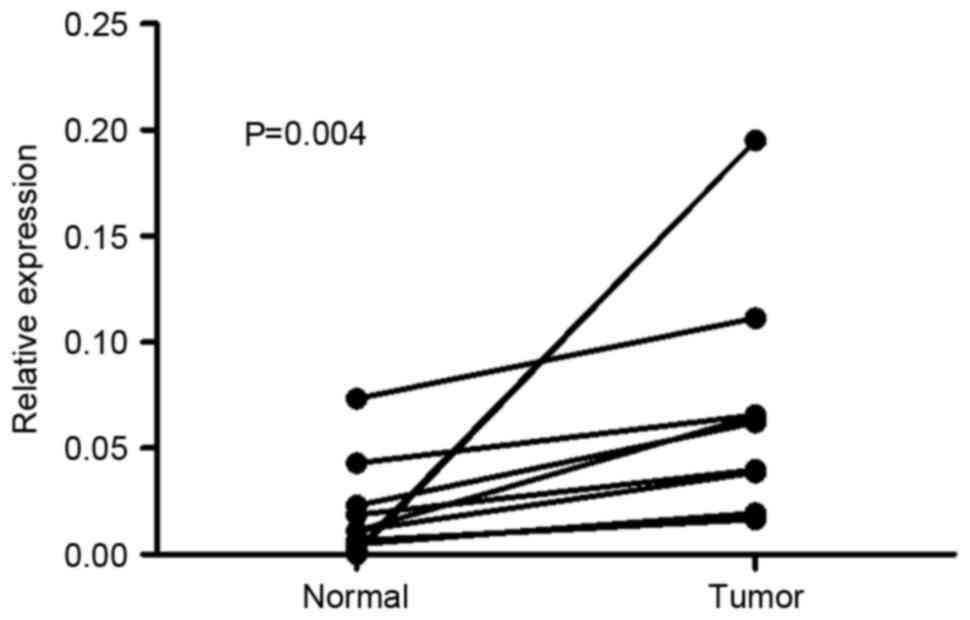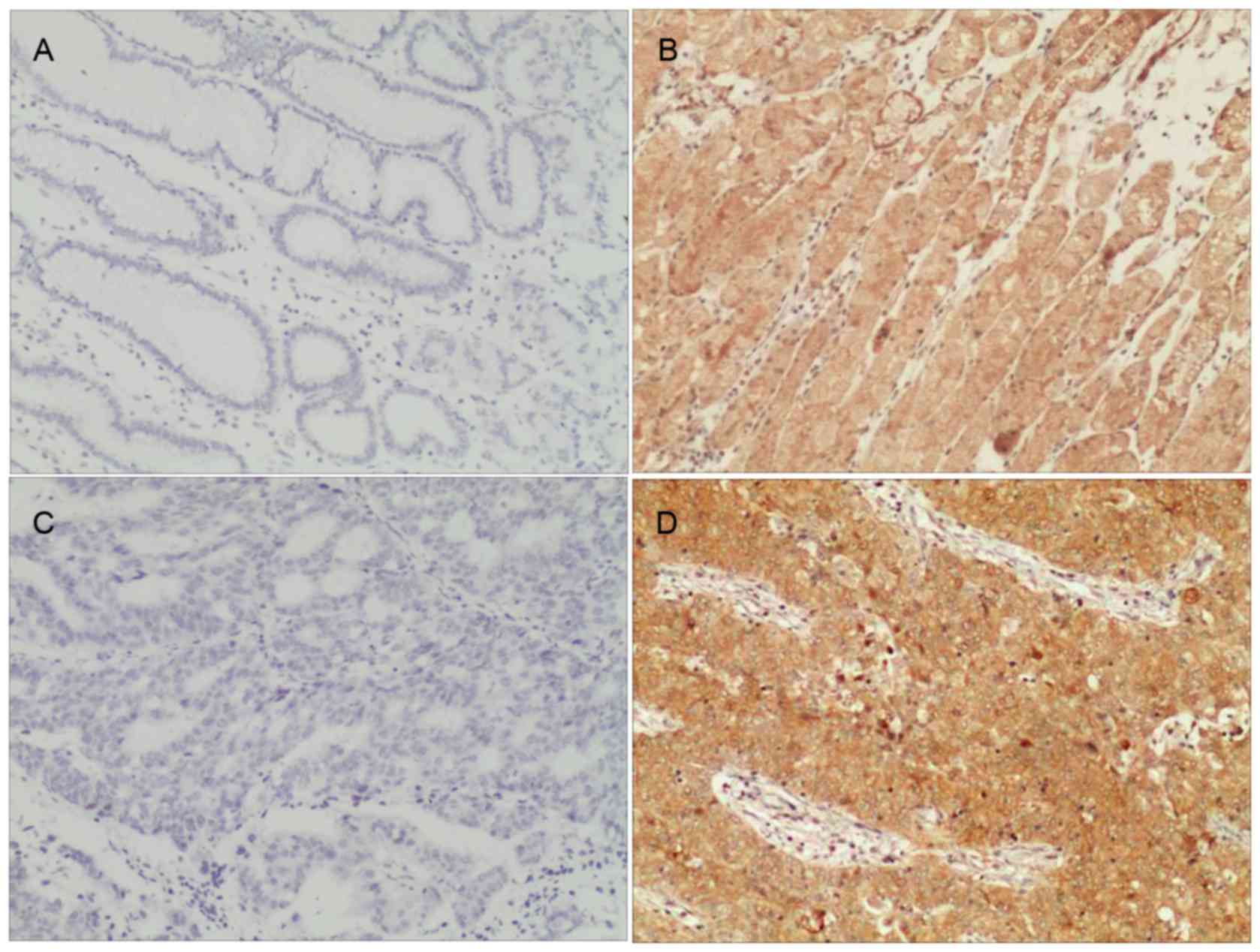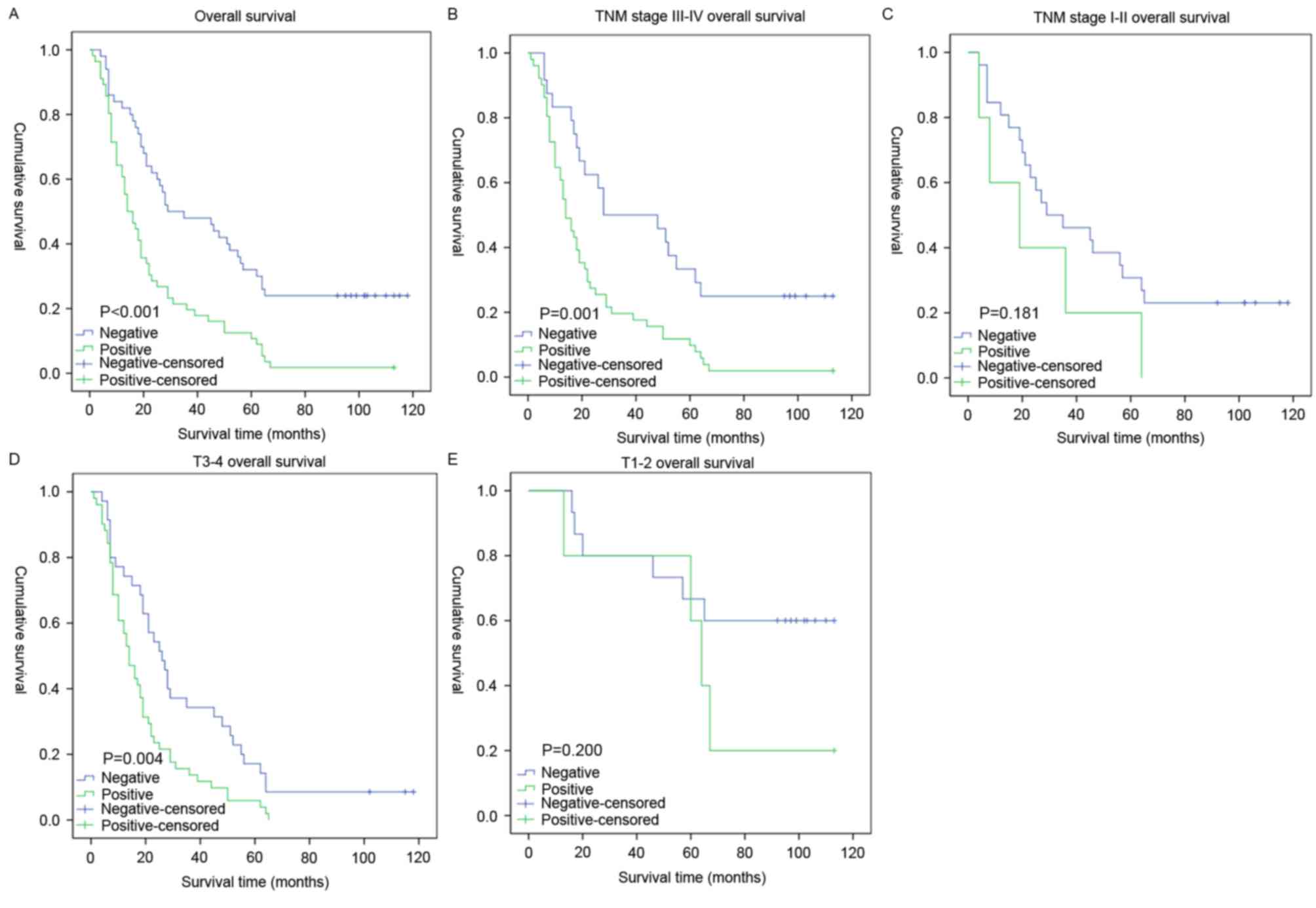|
1
|
Torre LA, Bray F, Siegel RL, Ferlay J,
Lortet-Tieulent J and Jemal A: Global cancer statistics, 2012. CA
Cancer J Clin. 65:87–108. 2015. View Article : Google Scholar : PubMed/NCBI
|
|
2
|
Kim BS, Cho SW, Min SK and Lee BH:
Differences in prognostic factors between early and advanced
gastric cancer. Hepatogastroenterology. 58:1032–1040.
2011.PubMed/NCBI
|
|
3
|
Saragoni L: Upgrading the definition of
early gastric cancer: Better staging means more appropriate
treatment. Cancer Biol Med. 12:355–361. 2015.PubMed/NCBI
|
|
4
|
Krause M, Dent EW, Bear JE, Loureiro JJ
and Gertler FB: Ena/VASP proteins: Regulators of the actin
cytoskeleton and cell migration. Annu Rev Cell Dev Biol.
19:541–564. 2003. View Article : Google Scholar : PubMed/NCBI
|
|
5
|
Tang D, Zhang X, Huang S, Yuan H, Li J and
Wang Y: Mena-GRASP65 interaction couples actin polymerization to
Golgi ribbon linking. Mol Biol Cell. 27:137–152. 2016. View Article : Google Scholar : PubMed/NCBI
|
|
6
|
Chen XJ, Squarr AJ, Stephan R, Chen B,
Higgins TE, Barry DJ, Martin MC, Rosen MK, Bogdan S and Way M:
Ena/VASP proteins cooperate with the WAVE complex to regulate the
actin cytoskeleton. Dev Cell. 30:569–584. 2014. View Article : Google Scholar : PubMed/NCBI
|
|
7
|
Takahashi K and Suzuki K: WAVE2, N-WASP,
and Mena facilitate cell invasion via phosphatidylinositol
3-kinase-dependent local accumulation of actin filaments. J Cell
Biochem. 112:3421–3429. 2011. View Article : Google Scholar : PubMed/NCBI
|
|
8
|
Barzik M, Kotova TI, Higgs HN, Hazelwood
L, Hanein D, Gertler FB and Schafer DA: Ena/VASP proteins enhance
actin polymerization in the presence of barbed end capping
proteins. J Biol Chem. 280:28653–28662. 2005. View Article : Google Scholar : PubMed/NCBI
|
|
9
|
Wang W, Wyckoff JB, Goswami S, Wang Y,
Sidani M, Segall JE and Condeelis JS: Coordinated regulation of
pathways for enhanced cell motility and chemotaxis is conserved in
rat and mouse mammary tumors. Cancer Res. 67:3505–3511. 2007.
View Article : Google Scholar : PubMed/NCBI
|
|
10
|
Du JW, Xu KY, Fang LY and Qi XL: Clinical
significance of Mena and Her-2 expression in breast cancer. Eur J
Gynaecol Oncol. 33:455–458. 2012.PubMed/NCBI
|
|
11
|
Hu K, Wang J, Yao Z, Liu B, Lin Y, Liu L
and Xu L: Expression of cytoskeleton regulatory protein Mena in
human hepatocellular carcinoma and its prognostic significance. Med
Oncol. 31:9392014. View Article : Google Scholar : PubMed/NCBI
|
|
12
|
Toyoda A, Kawana H, Azuhata K, Yu J, Omata
A, Kishi H, Higashi M and Harigaya K: Aberrant expression of human
ortholog of mammalian enabled (hMena) in human colorectal
carcinomas: Implications for its role in tumor progression. Int J
Oncol. 34:53–60. 2009.PubMed/NCBI
|
|
13
|
Gurzu S, Jung I, Prantner I, Chira L and
Ember I: The immunohistochemical aspects of protein Mena in
cervical lesions. Rom J Morphol Embryol. 50:213–216.
2009.PubMed/NCBI
|
|
14
|
Pino MS, Balsamo M, Di Modugno F,
Mottolese M, Alessio M, Melucci E, Milella M, McConkey DJ,
Philippar U, Gertler FB, et al: Human Mena+11a isoform serves as a
marker of epithelial phenotype and sensitivity to epidermal growth
factor receptor inhibition in human pancreatic cancer cell lines.
Clin Cancer Res. 14:4943–4950. 2008. View Article : Google Scholar : PubMed/NCBI
|
|
15
|
Rutkowski P, Wozniak A, Debiec-Rychter M,
Kąkol M, Dziewirski W, Zdzienicki M, Ptaszynski K, Jurkowska M,
Limon J and Siedlecki JA: Clinical utility of the new American
Joint Committee on Cancer staging system for gastrointestinal
stromal tumors: Current overall survival after primary tumor
resection. Cancer. 117:4916–4924. 2011. View Article : Google Scholar : PubMed/NCBI
|
|
16
|
Arocho A, Chen B, Ladanyi M and Pan Q:
Validation of the 2-DeltaDeltaCt calculation as an alternate method
of data analysis for quantitative PCR of BCR-ABL P210 transcripts.
Diagn Mol Pathol. 15:56–61. 2006. View Article : Google Scholar : PubMed/NCBI
|
|
17
|
Hamashima C: Current issues and future
perspectives of gastric cancer screening. World J Gastroenterol.
20:13767–13774. 2014. View Article : Google Scholar : PubMed/NCBI
|
|
18
|
Jemal A, Bray F, Center MM, Ferlay J, Ward
E and Forman D: Global cancer statistics. CA Cancer J Clin.
61:69–90. 2011. View Article : Google Scholar : PubMed/NCBI
|
|
19
|
Matsuda T, Ajiki W, Marugame T, Ioka A,
Tsukuma H and Sobue T; Research Group of Population-Based Cancer
Registries of Japan, : Population-based survival of cancer patients
diagnosed between 1993 and 1999 in Japan: A chronological and
international comparative study. Jpn J Clin Oncol. 41:40–51. 2011.
View Article : Google Scholar : PubMed/NCBI
|
|
20
|
He CZ, Zhang KH, Li Q, Liu XH, Hong Y and
Lv NH: Combined use of AFP, CEA, CA125 and CAl9-9 improves the
sensitivity for the diagnosis of gastric cancer. BMC Gastroenterol.
13:872013. View Article : Google Scholar : PubMed/NCBI
|
|
21
|
Fuchs CS, Tomasek J, Yong CJ, Dumitru F,
Passalacqua R, Goswami C, Safran H, dos Santos LV, Aprile G, Ferry
DR, et al: Ramucirumab monotherapy for previously treated advanced
gastric or gastro-oesophageal junction adenocarcinoma (REGARD): An
international, randomised, multicentre, placebo-controlled, phase 3
trial. Lancet. 383:31–39. 2014. View Article : Google Scholar : PubMed/NCBI
|
|
22
|
Yamada Y, Boku N, Nishina T, Yamaguchi K,
Denda T, Tsuji A, Hamamoto Y, Konishi K, Tsuji Y, Amagai K, et al:
Impact of excision repair cross-complementing gene 1 (ERCC1) on the
outcomes of patients with advanced gastric cancer: Correlative
study in Japan Clinical Oncology Group Trial JCOG9912. Ann Oncol.
24:2560–2565. 2013. View Article : Google Scholar : PubMed/NCBI
|
|
23
|
Tewari M, Kumar A, Mishra RR, Kumar M and
Shukla HS: HER2 expression in gastric and gastroesophageal cancer:
Report from a tertiary care hospital in North India. Indian J Surg.
77 Suppl 2:S447–S451. 2015. View Article : Google Scholar
|
|
24
|
Ye P, Zhang M, Fan S, Zhang T, Fu H, Su X,
Gavine PR, Liu Q and Yin X: Intra-tumoral heterogeneity of HER2,
FGFR2, cMET and ATM in gastric cancer: Optimizing personalized
healthcare through innovative pathological and statistical
analysis. PLoS One. 10:e01432072015. View Article : Google Scholar : PubMed/NCBI
|
|
25
|
Zhou Y, Li Y, Zheng J, Liu K and Zhang H:
Detecting of gastric cancer by Bcl-2 and Ki67. Int J Clin Exp
Pathol. 8:7287–7290. 2015.PubMed/NCBI
|
|
26
|
Philippar U, Roussos ET, Oser M, Yamaguchi
H, Kim HD, Giampieri S, Wang Y, Goswami S, Wyckoff JB,
Lauffenburger DA, et al: A Mena invasion isoform potentiates
EGF-induced carcinoma cell invasion and metastasis. Dev Cell.
15:813–828. 2008. View Article : Google Scholar : PubMed/NCBI
|
|
27
|
Kwiatkowski AV, Gertler FB and Loureiro
JJ: Function and regulation of Ena/VASP proteins. Trends Cell Biol.
13:386–392. 2003. View Article : Google Scholar : PubMed/NCBI
|
|
28
|
Di Modugno F, Bronzi G, Scanlan MJ, Del
Bello D, Cascioli S, Venturo I, Botti C, Nicotra MR, Mottolese M,
Natali PG, et al: Human Mena protein, a serex-defined antigen
overexpressed in breast cancer eliciting both humoral and CD8+
T-cell immune response. Int J Cancer. 109:909–918. 2004. View Article : Google Scholar : PubMed/NCBI
|
|
29
|
Gertler FB, Niebuhr K, Reinhard M, Wehland
J and Soriano P: Mena, a relative of VASP and drosophila enabled,
is implicated in the control of microfilament dynamics. Cell.
87:227–239. 1996. View Article : Google Scholar : PubMed/NCBI
|
|
30
|
Bear JE, Loureiro JJ, Libova I, Fässler R,
Wehland J and Gertler FB: Negative regulation of fibroblast
motility by Ena/VASP proteins. Cell. 101:717–728. 2000. View Article : Google Scholar : PubMed/NCBI
|
|
31
|
Drees F and Gertler FB: Ena/VASP: Proteins
at the tip of the nervous system. Curr Opin Neurobiol. 18:53–59.
2008. View Article : Google Scholar : PubMed/NCBI
|
|
32
|
Neel NF, Barzik M, Raman D,
Sobolik-Delmaire T, Sai J, Ham AJ, Mernaugh RL, Gertler FB and
Richmond A: VASP is a CXCR2-interacting protein that regulates
CXCR2-mediated polarization and chemotaxis. J Cell Sci.
122:1882–1894. 2009. View Article : Google Scholar : PubMed/NCBI
|
|
33
|
Entenberg D, Wyckoff J, Gligorijevic B,
Roussos ET, Verkhusha VV, Pollard JW and Condeelis J: Setup and use
of a two-laser multiphoton microscope for multichannel intravital
fluorescence imaging. Nat Protoc. 6:1500–1520. 2011. View Article : Google Scholar : PubMed/NCBI
|
|
34
|
Goswami S, Philippar U, Sun D, Patsialou
A, Avraham J, Wang W, Di Modugno F, Nistico P, Gertler FB and
Condeelis JS: Identification of invasion specific splice variants
of the cytoskeletal protein Mena present in mammary tumor cells
during invasion in vivo. Clin Exp Metastasis. 26:153–159. 2009.
View Article : Google Scholar : PubMed/NCBI
|
|
35
|
Condeelis J, Singer RH and Segall JE: The
great escape: When cancer cells hijack the genes for chemotaxis and
motility. Annu Rev Cell Dev Biol. 21:695–718. 2005. View Article : Google Scholar : PubMed/NCBI
|
|
36
|
Di Modugno F, Mottolese M, Di Benedetto A,
Conidi A, Novelli F, Perracchio L, Venturo I, Botti C, Jager E,
Santoni A, et al: The cytoskeleton regulatory protein hMena (ENAH)
is overexpressed in human benign breast lesions with high risk of
transformation and human epidermal growth factor
receptor-2-positive/hormonal receptor-negative tumors. Clin Cancer
Res. 12:1470–1478. 2006. View Article : Google Scholar : PubMed/NCBI
|
|
37
|
Gurzu S, Jung I, Prantner I, Ember I,
Pávai Z and Mezei T: The expression of cytoskeleton regulatory
protein Mena in colorectal lesions. Rom J Morphol Embryol.
49:345–349. 2008.PubMed/NCBI
|
|
38
|
Di Modugno F, DeMonte L, Balsamo M, Bronzi
G, Nicotra MR, Alessio M, Jager E, Condeelis JS, Santoni A, Natali
PG and Nisticò P: Molecular cloning of hMena (ENAH) and its splice
variant hMena+11a: Epidermal growth factor increases their
expression and stimulates hMena+11a phosphorylation in breast
cancer cell lines. Cancer Res. 67:2657–2665. 2007. View Article : Google Scholar : PubMed/NCBI
|

















